The strangers sharing stories on Edinburgh's listening bench
- Published
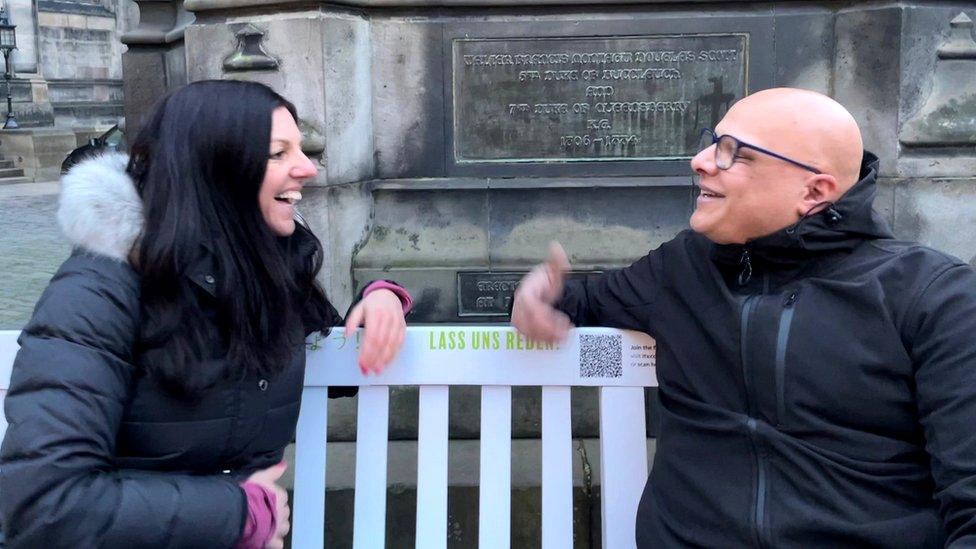
BBC journalist Angie Brown was joined by several people on a listening bench in Edinburgh's Old Town
Special benches offering people somewhere to sit down and chat with strangers in a bid to tackle loneliness have been popping up in town centres, parks and even school playgrounds in recent years. When a new "listening bench" appeared on Edinburgh's Royal Mile last week, BBC Scotland journalist Angie Brown decided to take a seat to see who she would meet.
At first I felt a bit self conscious. I am normally comfortable sitting on my own on the traditional wooden benches across the city but this one is brightly painted white and green and I felt the throng of passers-by were looking at me.
But I only had a few awkward minutes before the first of my three encounters with people eager to talk.
'Would you like to go for a cup of tea some time?'
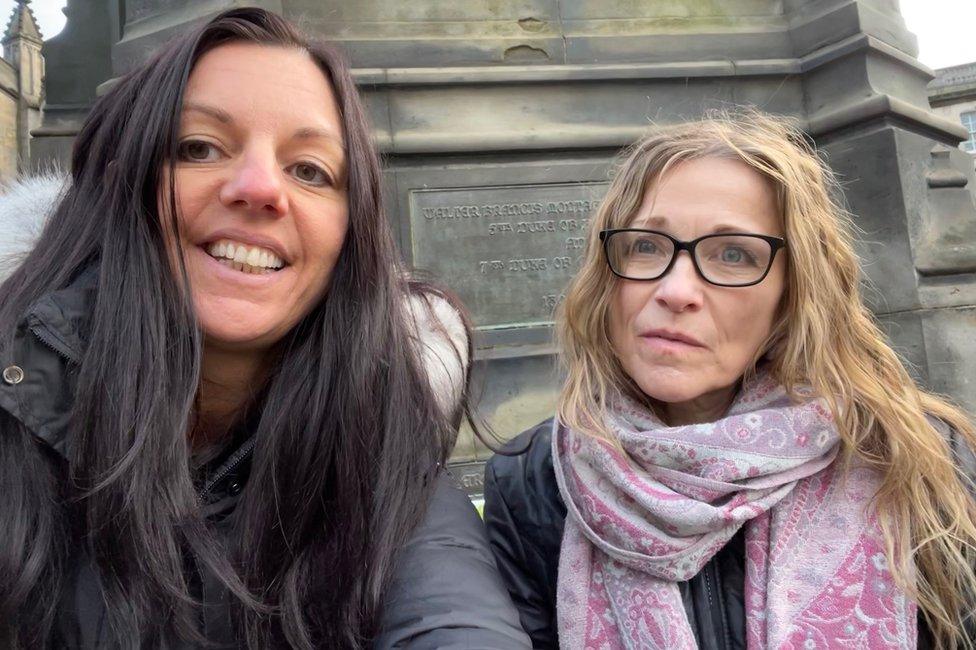
Fiona Cowie shared memories of her late father and chatted about her business and travels with Angie Brown
Fiona Cowie joined me on the bench because she wanted to listen to a nearby busker who was singing her late father's favourite song.
"She's singing Ave Maria so I just had to stop to think about my dad. It was the tenth anniversary of his death a few weeks ago," she told me.
"He would play the song often when we were growing up in Wick. I have very happy memories of him and his death has been a huge loss to me and my three sisters."
Her late father, Wallace Cowie, who was a bus driver and "amazing drummer", loved writing poetry and named her Fiona, meaning fair one, from work by Scottish poet James Macpherson.
She left home to move to Edinburgh when she was a teenager and studied to become a reflexologist.
She said: "It's a different way of life up there and I wanted to travel, I went all over the place from my base in Edinburgh.
"Then 10 years ago I was just about to travel to Budapest when I heard my dad was very ill.
"There was only a train to Inverness so I then had to catch a taxi to Wick. It was easily a two-hour trip and cost hundreds of pounds.
She added: "I've still never made it to Budapest and I have no interest in it now since he died."
As well as telling me about her dad, Fiona, who lives on her own in Leith, talked about her reflexology business and working with the homeless at Christmas.
After an hour on the bench she was getting cold and got up to leave.
She added: "I've really enjoyed talking with you, would you like to go for a cup of tea some time?"
The busker keeping warm with some opera singing
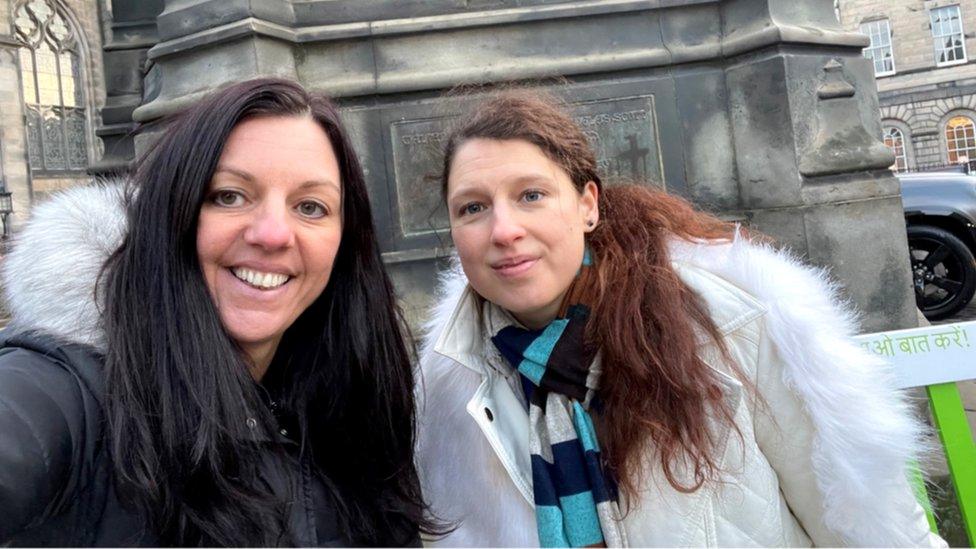
Trained opera singer Beatrix Milan, told Angie Brown, how she came to live in Scotland six years ago
Professional opera singer and busker Beatrix Milan was next to join me on the bench.
It was her rendition of Ave Maria that had earlier caught Fiona's attention.
The 31-year-old Hungarian, who has been living in Edinburgh for six years, sings near the spot where the bench was put in place and told me she had seen lots of people listening to each other on it over the past few days.
A man who had been standing listening to her singing began belting out a song in an operatic voice before shaking her hand and saying he sang baritone.
"What type of singing voice do you have?" I asked her. She is a soprano.
She told the man he had "real potential" and that she could teach him, but he said he was only visiting the city as a tourist.
It was getting very cold now and I asked if it affected her voice and how she coped being outside for so long in such temperatures.
"I wear gloves, but it's the diaphragm work that keeps the rest of me warm. It is the intensity of the breathing using long phases, pushing out the abdomen, it's a singing muscle workout."
Beatrix started busking after visiting her sister in Dundee.
"She was moving out and I was helping her clean when I broke the oven door and didn't have enough money to have it repaired so I went out into the street and started singing classical songs."
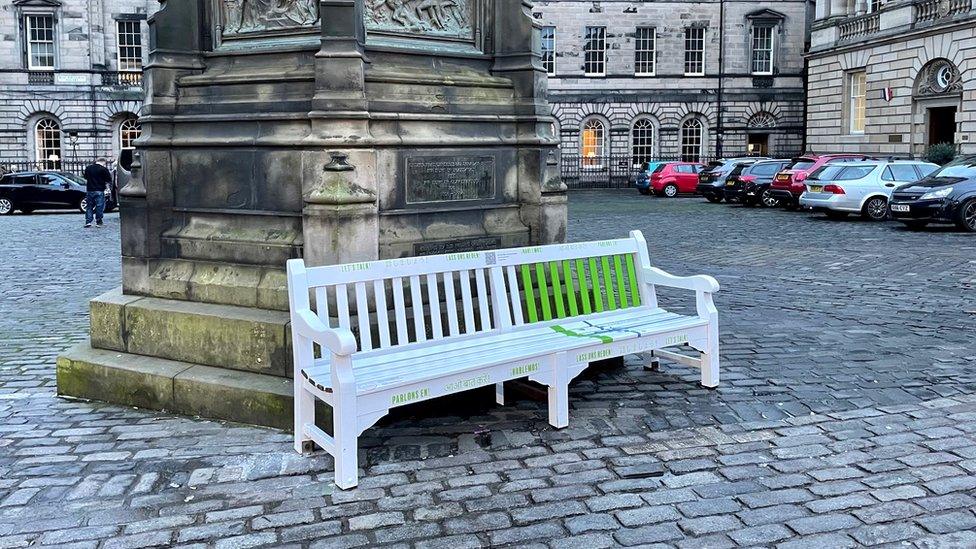
The listening bench is in the Royal Mile near the entrance to St Giles cathedral
Beatrix, who studied for a music degree in Vienna, told me she dreams of singing with Scottish Opera, but for now enjoys busking. It also gives her somewhere to practice "as my voice is often too loud for singing in flats I've lived in."
Since arriving in Scotland from her home in Siofok, she has worked in call centres and as a waitress but said busking is where she makes the most money.
"When I first started singing in the street I didn't do opera because I didn't think it would be well received in Scotland, especially for my age group.
"But now I cannot believe the reaction I get. I've had people paint pictures of me, others put notes in my hand saying I'm their hero and drunken teenagers give me £20, saying they love my singing."
'My hair fell out due to stress'
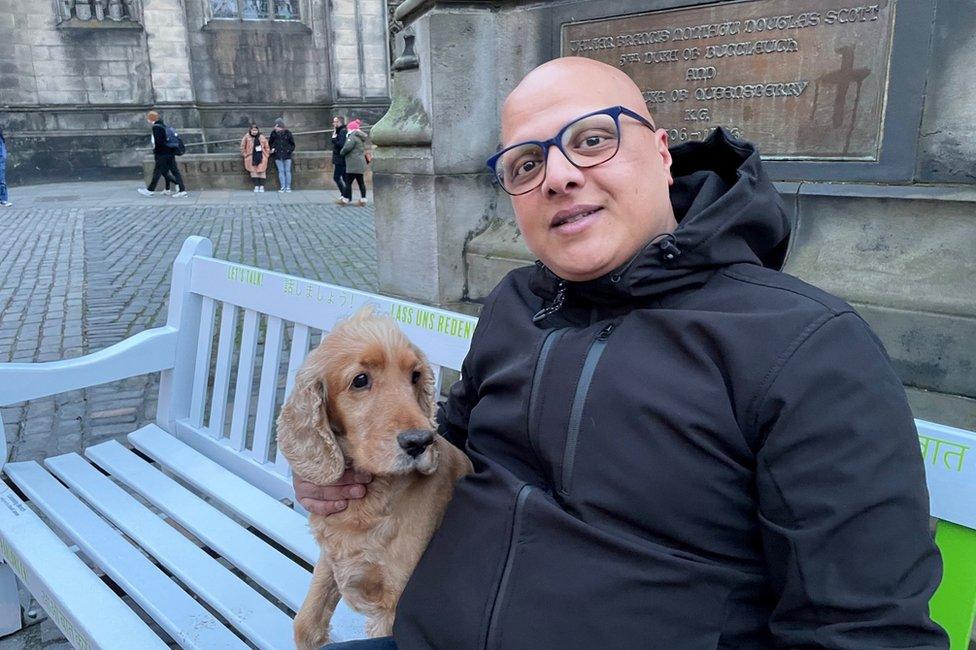
Zaheer Aslam works in his family's retail business and lives with his dog, Randolph, in Edinburgh
Beatrix left to go to her other job of waitressing and I was then joined on the bench by Zaheer Aslam who asked if I had time to speak to him.
I told him I was a journalist and there to listen and he started to talk to me about his experience of having alopecia. He first started losing hair when he was aged 13 and at secondary school in Edinburgh.
"I didn't notice it coming out, or it lying on my pillow or anything like that. It was patches the size of a 50 pence coin," the 40-year-old said.
"I had longish curtains hair so my mum used to dab her black eyeliner onto the patches to take the eye away from the areas."
He was given permission to wear a hat in class at school. "It was a Cypress Hill beanie hat," he told me.
"My doctor wanted me to have steroid injections in my head but I didn't want that."
Each week his dad drove him to see someone using natural medicines in Huddersfield. The patches would grow back but then others would appear.
Zaheer told me that when he was 19 he learned a friend had died and overnight his eyelashes and eyebrows all fell out.
"I lost 90% of the hair on my body. I heard it was stress that caused alopecia but it wasn't until years later that I realised I had been stressed."
In 2008 he drove from Scotland to Mongolia and his hair started growing back.
He said: "I was the happiest version of myself on that adventure, I had left the stress behind and didn't have any pressures and that's when I noticed my hair growing back."
Once back in Scotland though his hair stopped growing again.
Asked about his experience of lockdown, Zaheer - who works in his family's shop in the city centre and lives with his dog - said he found the first lockdown very hard.
"But then I got used to it and realised I didn't have the same work stresses and my hair began to grow back again," he told me.
"I caught up with myself and I recognise now that's when my hair grew back. I lost my hair again though a few months later. So I've come to realise that I need to be less stressed, that's what I need to look for in life."
The listening bench on the Royal Mile in Edinburgh is one of six benches which have been put in place in cities across the UK as part of ITV programme Good Morning Britain's One Million Minutes campaign to tackle loneliness., external